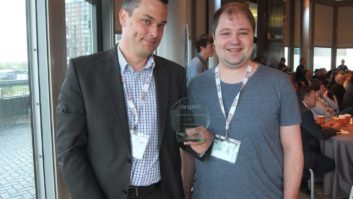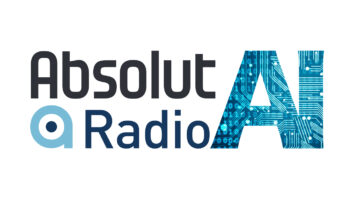
Christian O’Connell hosts the breakfast show
across the Absolute Radio Network.
LONDON — Absolute Radio’s listeners are now able choose from seven different music playlists when they tune to the award-winning Christian O’Connell breakfast show.
When Absolute rebranded from Virgin Radio in the United Kingdom in September 2008, the decision was made to rebroadcast the main station’s breakfast show on its two other digital services. This meant that at breakfast, the main station’s playlist would be heard on the digital stations, which had different musical focuses at other times.
A CHALLENGE
Tony Moorey, content director at Absolute Radio said: “From day one, we knew that it was a compromise, but we thought it was the right compromise to make, and indeed the listeners proved that it wasn’t too big an issue.”
By the end of last year, Absolute’s network had grown to include six digital services as well as the main station, which is also broadcast on FM in London and AM across the U.K. Five of the stations focus on decades of music from the 1960s to 2000s, including the U.K.’s biggest all-digital commercial station, Absolute Radio 80s, along with Absolute Classic Rock. O’Connell’s breakfast show continues to be broadcast on all of the stations, with up to one-third of its total audience coming from listeners to the digital services.

Tony Moorey, Content Director
of the Absolute Radio Network “It was last November when our Head of Production Dan Wright persuaded me that even though it was going to be challenging, the music was something we should look at,” said Moorey. A group was set up to work on “Project Banana” (named because of the “split” content), with Music Scheduler Martin Lee, Robbie Harrison from Absolute’s technology department and the breakfast show team.
The station’s RCS GSelector music scheduling software provided the solution.
“It was the first time we’d been asked to do anything like this,” said Jon Earley, managing director of RCS U.K. “We’d had conversations with a couple of stations about whether we could split music, but it’s the way that we could interrogate the GSelector software through an API that gave us the ability to do it.”
Earley added, “We supplied software that scheduled different songs on different radio stations but matched by time. Obviously, during the split songs they need them to finish at the same time, as the last thing listeners want is the last minute of the song cut off. They wanted the same duration, but different songs based upon the decades of the digital stations.”
Earley explained the challenge they faced: “What was also important was that the rules that the station had set up in the GSelector software were still obeyed, because although the timing was important, they didn’t want the same song played at the same time every day. So we had to come up with something that matched on time, but also still respected all the rules and goals that they’d set up within GSelector.”
OVERCOMING OBSTACLES

Other issues had to be overcome. “The main Absolute Radio station would schedule a four-minute 30-second duration song, and then we’d schedule Absolute ’60s; there just weren’t that many songs in the ’60s database that were that long, but there were lots of shorter two-minute songs,” said Earley. “So we thought, in that scenario, could we put in two songs instead? Then Absolute said they also needed a station ID between every song, because that’s station policy — so we wrote in a bit that allowed them to split them with the ID number of a jingle in their playout system, and we put that in between the songs as well.”

The RCS GSelector Song Balancer Software
After this, although this forms a separate app for GSelector, the schedule is written back to the main GSelector station, so the log can then be exported into Absolute’s Genesys playout system in the usual way.
At other times, different methods of sharing content across the network are used. Comedian Frank Skinner’s show goes out live on Absolute Radio from 8 to 11 a.m. on Saturdays, and his show is time-shifted an hour on the other digital stations. “We have a producer essentially ‘topping and tailing’ Frank’s links, removing time-checks, any references to texting [SMS] if it’s too late for the listener to get their texts on air, any references to the songs, and then saving those links into carts that will appear an hour later in the digital stations’ logs,” said Moorey.
So why not do the same for breakfast? “It’s so much more fast-moving. Even if we got it down to 15 minutes, which looked to be the tightest we could turn it around in, we’ve lost interaction, we do competitions in breakfast which obviously wouldn’t work, and even time-checks are so much more important,” Moorey said. “All of that meant that something that works really nicely for Frank on a Saturday just wouldn’t work for Christian at breakfast.”
Jon Earley of RCS U.K. says there’s been interest in this development from around the world, and hints there might be other potential ways of using the new feature.
“Certainly if there were stations who wanted to have the same presenter, but doing it on two different stations at the same time, this technology allows them to do that. At the moment we’re matching on the runtime of the songs, but there’s no reason why we couldn’t match on another criteria if they wanted to do so.”
Will Jackson reports on the industry for Radio World from London.










